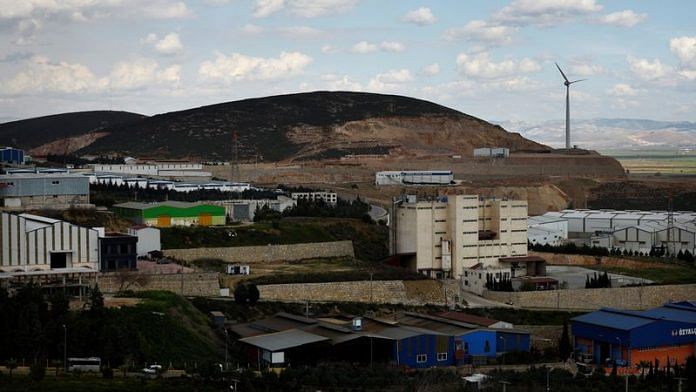Antakya/Istanbul: Mehmet Alkan, a shoe-sole manufacturer in Turkey’s earthquake-hit south, doesn’t know what will become of his company after some of his 220 employees died and half fled, reflecting the difficult transformation ahead for industry in the region.
Forty of his workers and some families sheltered for a while in the undamaged Alkan Taban factory in Antakya after the massive quakes on 6 February.
“We only have 110 workers after some died and others left the city, so production capacity dropped,” said Alkan, the manager.
Turkey’s deadliest disaster in modern history struck a region rich in textile production and agriculture that accounts for 16 per cent of total employment and around 11 per cent of industrial production, a report by the Istanbul Chamber of Industry showed.
It forced millions to leave 11 southeastern provinces that were home to some 14 million people. Some say they may not return despite Ankara’s plan to swiftly rebuild hundreds of thousands of damaged or collapsed buildings.
Hundreds of businesses that re-started operations a month after the quake face shortages of staff who moved to nearby villages, relatives in other cities or to government-sponsored accommodation of tents and container homes, interviews show.
“We turned our showroom into a dormitory” for employees, Alkan said. “Most of their families left the city or moved to safer village areas. They are afraid. We are waiting for others to come back.”
He said the company’s shuttle used to drive up to 50 km (30 miles) to collect workers from their homes, but it now drives double that distance to reach the villages.
The disaster, which killed more than 52,000 people in Turkey and Syria, is a challenge to President Tayyip Erdogan’s plan to transform Turkey into a competitive manufacturing power. Business groups and economists estimate quake fallout costing some $100 billion and shaving one to two percentage points off the country’s gross domestic product (GDP).
Some funding meant to boost production, employment and exports under Erdogan’s economic plan will be directed towards aid and rebuilding efforts in the area, they say.
Reshuffling
To ease the fallout, the government has rolled out short-work allowances for workers and easier access to loans for affected companies.
In Antakya, the hardest-hit city where dozens of blocks were flattened, only around a third of production capacity is being used a month after the earthquake, sector officials and experts say. It could take years to return to normal, bringing about a shift in demography in the area.
“We need urgent government support to start reverse migration for businesses. We are losing qualified workforce. A safe environment with facilities like schools and social spaces needs to be set up,” said Hikmet Cincin, the head of Antakya’s Chamber of Trade and Industry.
More than 600,000 homes collapsed or were severely damaged across the region, official data shows, while the government promised to build at least 250,000 units of accommodation within one year.
“It is very difficult to predict when housing and businesses will return to normal in the region. Permanent accommodations and reopened schools will be crucial,” said Serdar Sayan, director of the centre for social policy research (SPM) at Ankara-based TOBB University.
The region could also see industries reshuffled as construction sector workers arrive, Sayan said.
“People who started new, permanent lives in other cities are mainly from the middle- and upper-income classes,” while those who stayed tend to earn lower incomes and need state aid, Sayan said.
Seher Icici, who handled logistics and accounting at a textile machinery company in Kahramanmaras, near the epicentre of the earthquake, moved some 250 km to the west with her two small children, to the city of Mersin.
“We are staying temporarily since we do not have a home to return to now. We had to leave the city as we could not find temporary accommodation,” Icici said.
Families she knew had already left the area and enrolled their children in schools elsewhere, she said, and most won’t return at least until the end of the academic year.
“I cannot work right now but I am lucky as my boss paid my salary and some support money,” Icici said. “We are getting by with it for now.”
(Additional reporting by Ezgi Erkoyun; Editing by Jonathan Spicer, Daren Butler and Nick Macfie)
Disclaimer: This report is auto generated from the Reuters news service. ThePrint holds no responsibilty for its content.
Also read: German police seek motive in shooting at Jehovah’s Witnesses church



